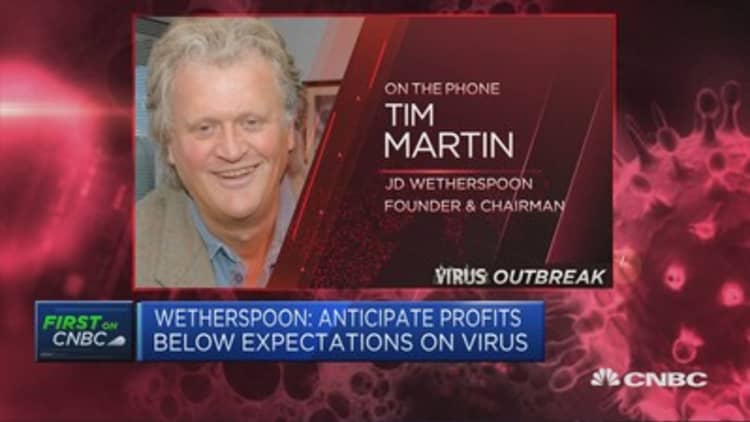Major British pub chain J.D. Wetherspoon plans to stay open in defiance of government advice amid the coronavirus pandemic, but has vowed to implement social distancing between drinkers.
U.K. Prime Minister Boris Johnson has advised the public to avoid pubs and restaurants, but the government has so far stopped short of an enforced lockdown. The country has now confirmed 2,716 cases of coronavirus, according to Johns Hopkins University.
Wetherspoon Chairman Tim Martin told CNBC that the government's guidance was "ambiguous" and likened the closure of pubs to the shutting down of Parliament.
"I don't think pubs and restaurants should be shut down completely. I think there should be social distancing, people shouldn't stand at the bar, and there are various measures you can put in place for safety, but I don't think it is right to close them," Martin told CNBC's "Squawk Box Europe," adding that such a move would be "too disruptive."
"If we can stay open and tick over with a few staff, distance between the tables and so on, I think that is a sensible thing for us and it is better for the country," Martin said.
Martin suggested that if trade falls by 50%, he would be able to retain more than half of his staff. Wetherspoons reported first-half profit before tax of £57.9 million on Friday morning, up 15% from the previous year, but canceled its dividend and warned that earnings will suffer as a result of the coronavirus.
'Herd immunity'
Martin also backed the controversial "herd immunity" approach to tackling the outbreak adopted by Dutch Prime Minister Mark Rutte.
"The reality is that in the near future a large part of the Dutch population will be infected with the virus," Rutte said in a national address Monday. "We can slow down the spread of the virus while building controlled group immunity."
The same approach was originally preferred by the British government, which has since reversed course.
"They know that some people are going to get the virus, we don't have a vaccine, and as people build up immunity, particularly young people who are very low threat, the next time the virus comes back which it will do once the lockdown finishes, you're in a better position," Martin argued.

The World Health Organization has questioned the evidence supporting the "herd immunity" tactic, since COVID-19 is too new among the population to understand its immunological behavior.
Another concern would be the human cost. Based on available confirmed diagnoses, the U.K.'s death rate from the virus sits at around 5%. Britain's chief scientific officer Patrick Vallance has suggested that 60-70% of a population would need to contract the virus in order to develop this immunity.
Based on the assumption that 60% of the U.K.'s 66.44 million people, according to 2018 figures from the Office for National Statistics (ONS), will contract the virus, and the current death rate, almost 2 million people in the U.K would have to die as part of the initial herd immunity effort.
However, testing is still somewhat limited and the case total is widely believed to be much higher. As of Thursday, 64,621 people in the UK had been tested for coronavirus, but the government aims to be testing 25,000 people a day within four weeks.

